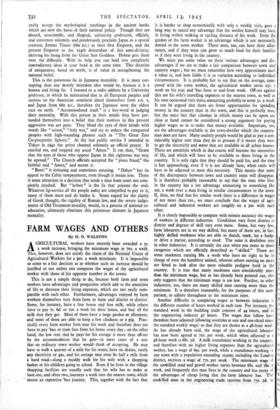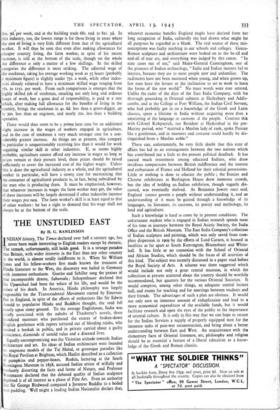FARM WAGES AND OTHERS
By H. D. WALSTON
AGRICULTURAL workers have recently been awarded a 5s. a week increase, bringing the minimum wage to 7os. a week. This, however, does not satisfy the claim of the National Union of Agricultural Workers for a 9os. a week minimum. It is impossible to come to a fair decision as to whether such an increase should be justified or not unless one compares the wages of the agricultural worker with those of his opposite number in the towns.
This is not a simple thing to do, because both farm and town workers have advantages and perquisites which add to the amenities of life or decrease their living expenses, which are not easily com- parable with each other. Furthermore, advantages enjoyed by farm workers themselves vary from farm to farm and district to district. Some, for instance, have a free house and free milk, while others have to pay 7s. 6d. or ros. a week for their house, and buy all the milk that they get. Most of them have a large garden or allotment, and some of them are able to keep a few chickens or a pig. Prac- tically every farm worker lives near his work and therefore does not have to pay 'bus or tram fare from his home every day ; on the other hand, the low rent that he pays for his cottage is more than off-set by the accommodation that he gets—in most cases of a sort that no ordinary town worker would think of accepting. He may have to walk a quarter of a mile for his water, have no drains, rarely any electricity or gas, and his cottage may even be half a mile from a hard road—along a muddy walk for his wife with a shopping basket or his children going to school. Even if he lives in the village shopping facilities are usually such that his wife has to make at least one, and often two, journeys a week into the nearest town, which means an expensive 'bus journey. This, together with the fact that it is harder to shop economically with only a weekly visit, goes a long way to cancel any advantage that the worker himself may have
in living within walking or cycling distance of his work. Even the garden of the farm worker is an advantage which is not necessarily denied to the town worker. These men, too, can have their allot- ments, and if they want can grow as much food for their families as if they were living in the country.
We must put some value on these various advantages and dis- advantages if we are to make a fair comparison between town and country wages ; but we must remember how very approximate such
a value is, and how liable it is to variation according to individual circumstances. It is probably fair to say that on the average, com- pared with the town worker, the agricultural worker saves 15s. a week on his rent and 'bus fares to and from work. Off-set against this are his wife's travelling expenses to the nearest town, as well as his own occasional visit there, amounting probably to some 5s. a week. It can be argued that there are fewer opportunities for spending money in the country than in the town, and this is perfectly true, but the mete fact that cinemas in which money can be spent are close at hand cannot be considered a strong argument for paying higher wages so as to make that money available. Important, too, are the advantages available to the town-dweller which the country- man does not have. Many country people would be glad to pay a con- siderably higher rent than they do at present if it meant they were to get the electricity and water that are available in all urban houses. These are amenities which in due course will become the necessities "of life, and which will have to be available to those living in the country. It is only right that they should be paid for, and the time is fast approaching, even if it is not already here, when rents will have to be adjusted to meet this necessity. This means that some of the discrepancy between town and country rents will disappear. It is therefore probably reasonable to say that the man who lives in the country . has a net advantage amounting to something like ros. a week over a man living in similar circumstances in the town. If, then, we find that for similar work there is a difference in wages of not more than los., we must conclude that the wages of agri- cultural and industrial workers are roughly on a par with each other.
It is clearly impossible to compare with minute accuracy the wages of workers in different industries. Conditions vary from district to district and degrees of skill vary even more. Some, but very few. farm labourers arc in no way skilled, but many of them are, in fact. highly skilled workmen who are able to thatch, stack, lay a hedge
or drive a tractor, according to need. The same is doubtless true I in other industries. It is certainly the case when you come to those categories which are officially described as " skilled." There are 1 some stockmen earning 86s. a week who have no right to be in r. charge of even the humblest animal, whereas others earning no more Ir are fitted to - look after the most valuable pedigree herd in the country. It is true that many stockmen earn considerably more than the minimum wage, but as has already been pointed out, this only suggests that the minimum wage is too low. Further, in other industries, too, there are many skilled men earning more than the minimum. It is therefore reasonable, for the purposes of this com- parison, to adhere throughout to the minimum rates.
Another difficulty in comp ring wages as between industries is the different number of hours worked in each case. For instance, the standard week in the building trade consists of 44 hours, and in the engineering industry 47 hours. The wages that follow have therefore been adjusted (allowing overtime at one and one-third times the standard weekly wage) so that they are shown as a 48-hour week. As has already been said, the wage of the agricultural labourer has now been agreed at 7os. per week, which when adjusted to a 48-hour week is 68s. 5d. A milk roundsman working in the country. and therefore with no higher living expenses than the agricultural worker, has a wage of 69s. per week, while a roundsman working in any town with a population exceeding ro,000, excluding the London district, receives a wage of 77s. per week. The minimum wage 4 the unskilled sand and gravel worker varies between 68s. and .78s. a week, and frequently this man lives in the country and has many of the advantages of cheap living that the farm labourer has. The unskilled man in the engineering • trade receives from 75s. 2d. :e Sos. 533. per week, and in the building trade 68s. sod. to Sts. 3d. In this industry, too, the lowest range is for those living in areas where the cost of living is very little different from that of the agricultural worker. It will thus be seen that even after making allowances for cheaper country living, the farm worker, in spite of his recent increase, is still at the bottom of the scale, though on the whole the difference is only a matter of a few shillings. In the skilled categories the difference is more striking. The adjusted wage of the stockman, taking his average working week as 55 hours (probably a minimum figure) is slightly under 75s. a week, while other indus- tries already referred to have a minimum skilled wage ranging from 78s. to 115s. per week. From such comparisons is emerges that the highly skilled job of stockman, entailing not only long and arduous hours of work, but a. great deal of responsibility, is paid at a rate which, after making full allowance for the benefits of living in the country, brings the stockman in 4s. 6d. less than a grave-digger, up to 3os. less than an engineer, and nearly 20S., less than a building operative.
There would thus seem to be a prima facie case for an additional slight increase in the wages of workers engaged in agriculture, and in the case of stockmen a very much stronger case for a con- siderably greater increase. As things are at present, this category in particular is unquestionably receiving less than it would for work requiring similar skill in other industries. If, as seems highly probable, agriculture cannot afford any increase in wages so long as prices remain at their present level, these prices should be raised sufficiently to cover the increased cost of the higher wages. Unless this is done the agricultural industry as a whole, and the agricultural worker in particular, will have a strong case for maintaining that the consumer of agricultural products is, in fact, being subsidised by the man who is producing them. It must be emphasised, however, that whatever increases in wages the farm worker may get, the value of these increases will be largely destroyed if other industries increase their wages pro rata. The farm worker's skill is at least equal to that of other workers: he has a right to demand that his wage shall not always be at the bottom of the scale.



























 Previous page
Previous page